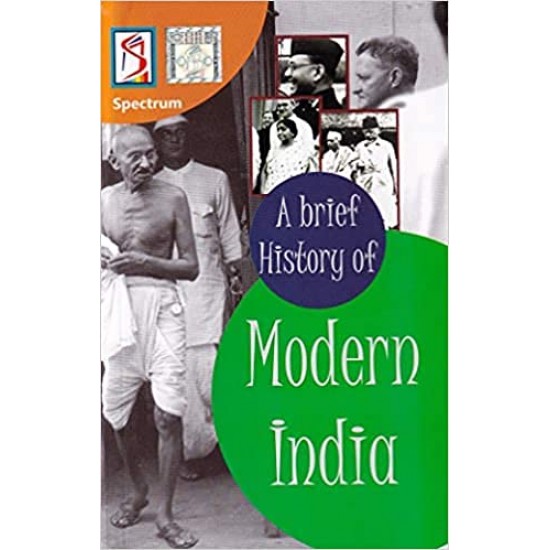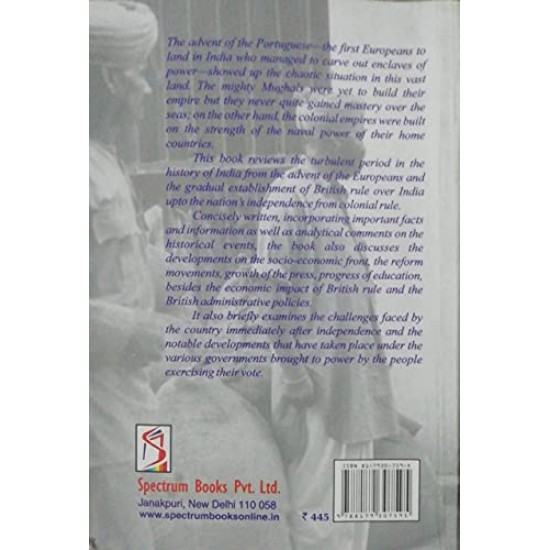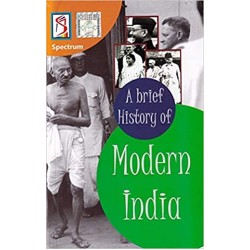A Brief History of Modern India- SPECTRUM FOR UPSC




- Stock: In Stock
- Brand: generic
- Model: 9788179307595
- Weight: 0.50kg
- Dimensions: 12.00cm x 15.00cm x 5.00cm
- SKU: B09BJNWX5K
- ISBN: 9788179307595
Exclusive Offers
-
Get 10% Discount: Use coupon code
VLE10for an instant 10% off on every product, up to ₹250. - Save Up to 28%: Get a GST invoice and save up to 28% on your purchase. Update your GST number here.
- Always Lowest Price: We guarantee the lowest prices on all products.
- Brand Warranty: All products come with an official brand warranty for your peace of mind.
- Want to Buy in Bulk? Get the best prices from our team. Click here to contact us.
Description
A Brief History of Modern India
SPECTRUM FOR UPSC
Welcome to our comprehensive guide on the history of Modern India, focusing on important events and developments that have shaped the nation as we know it today. This guide, based on the renowned book "A Brief History of Modern India" by Spectrum for UPSC, covers the period from the mid-18th century to the present day, providing a detailed overview of key moments in India's journey towards independence and beyond.
Chapter 1: The Arrival of the British
The history of Modern India begins with the arrival of the British East India Company in the mid-18th century. The company gradually expanded its influence in India through trade and military conquests, establishing control over vast territories and transforming the political landscape of the subcontinent.
Key events during this period include the Battle of Plassey in 1757, which marked the beginning of British dominance in India, and the Treaty of Buxar in 1764, which cemented the company's control over Bengal, Bihar, and Orissa.
Chapter 2: The Revolt of 1857
The Revolt of 1857, also known as the First War of Independence, was a major uprising against British rule in India. Sparked by a combination of political, economic, and social grievances, the revolt spread across various parts of the country, challenging British authority and leading to widespread violence and bloodshed.
Despite the suppression of the revolt by British forces, it had a significant impact on the course of Indian history, prompting the British government to abolish the East India Company and introduce direct rule over India through the Government of India Act of 1858.
Chapter 3: The Indian Nationalist Movement
The late 19th and early 20th centuries witnessed the emergence of the Indian nationalist movement, which sought to end British colonial rule and achieve self-rule for India. Prominent leaders such as Bal Gangadhar Tilak, Gopal Krishna Gokhale, and Annie Besant played key roles in mobilizing public opinion and promoting the cause of Indian nationalism.
The Indian National Congress, founded in 1885 by A.O. Hume, became the primary political organization advocating for Indian self-rule and played a crucial role in shaping the country's path towards independence.
Chapter 4: The Freedom Struggle
The early 20th century saw the intensification of the freedom struggle against British rule, with leaders like Mahatma Gandhi, Jawaharlal Nehru, and Subhas Chandra Bose leading the charge for independence through civil disobedience, non-cooperation, and mass mobilization.
Key events during this period include the Non-Cooperation Movement of 1920-22, the Civil Disobedience Movement of 1930-31, and the Quit India Movement of 1942, all of which contributed to mounting pressure on the British government to grant independence to India.
- Publisher : Rising Publications; 1st edition (1 July 2024)
- Language : English
- File size : 1354 KB
- Text-to-Speech : Enabled
- Screen Reader : Supported
- Enhanced typesetting : Enabled
- X-Ray : Not Enabled
- Word Wise : Enabled
- Print length : 1064 pages
Specifications
| Additional features | |
| Generic Name | Books |
| Language | English |
| General | |
| Condition | new |


